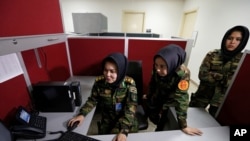Afghanistan says it will begin blocking all online activity and websites linked to terror groups or extremists later this week, under terms of a cybercrime bill the government signed into law last month.
The Ministry of Telecommunications and Information Technology said it is gathering a list of websites linked to terror groups or their supporters, based on information from the National Intelligence Directorate (NDS) and the Ministry of Information and Culture.
Najib Nangyal, a ministry spokesperson, said website-blocking will begin this Saturday, as authorized by the National Cyber Security Strategy of Afghanistan (NCSA) and the new Cyber Crimes Act.
Voice of concern
A dissenting voice has been raised by the nongovernmental organization Nai, Supporting Open Media in Afghanistan. The group opposes the new cybercrime law on the grounds that it limits freedom of expression and access to information.
Telecommunications ministry spokesperson Nangyal denied those charges in a statement to VOA's Ashna radio.
The new criminal law that President Ashraf Ghani signed last Friday contains 27 articles related to prohibited cyberactivities. It is the first comprehensive attempt to catalog cybercrimes and violations in 15 years, a period during which online activity in the country expanded greatly.
Internet services for 6 million
Although parts of Afghanistan are still ravaged by war, the country of 32 million people now has internet services capable of serving 6 million people. A lack of cyber regulations, meanwhile, has allowed terrorists and extremist groups to continue working online, the government said.
Media rights group Nai, established in 2005 with the support of the Internews network, is currently supported by funds from USAID, the U.S. international development agency. Mojib Khalwatgar, head of Nai, said his agency is concerned about vague and undefined terms used in much of the law, and in particular on its potential effect upon journalists.
Nai's statement of “general beliefs” about the new law says it appears to potentially criminalize any exchange of data or software from one computer to another, and that any normal activity by an organization's information technology staff could be construed to be a criminal act.
Mohammad Ahmadi contributed to this report




